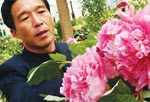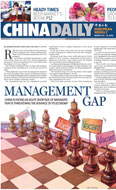Asia
Radiation injuries slow work at nuclear plant
Updated: 2011-03-25 09:40
(Agencies)
Despite government reassurances and appeals for people not to panic, many shops saw bottled water flying off the shelves.
"Customers ask us for water. But there's nothing we can do," said Tokyo supermarket worker Masayoshi Kasahara.
In the latest contamination finds, Kyodo news agency said radioactive caesium 1.8 times higher than the standard level was found in a leafy vegetable grown at a Tokyo research facility.
Singapore said on Thursday it had found radioactive contaminants in four samples of vegetables from Japan.
Earlier, Singapore and Australia joined the United States and Hong Kong in restricting food and milk imports from the zone. Many other nations have tightened screening.
German shipping companies are avoiding Japan.
"Things Getting Better"
The estimated $300 billion damage from the quake and tsunami is the world's costliest natural disaster, dwarfing Japan's 1995 Kobe quake and Hurricane Katrina in New Orleans in 2005.
In Japan's north, more than a quarter of a million people are in shelters. Exhausted rescuers are still sifting through the wreckage of towns and villages, retrieving bodies and pulling out photos for the consolation of survivors.
Official numbers of dead and missing are revised up every day - 9,811 people confirmed dead and 17,541 missing by Friday.
Authorities are burying unidentified bodies in mass graves.
Amid the suffering, though, there was a sense that Japan was turning the corner in its humanitarian crisis. Aid flowed to refugees, and phone, electricity, postal and bank services began returning to the north, albeit sometimes by makeshift means.
"Things are getting much better," said 57-year-old Tsutomu Hirayama, with his family at an evacuation centre in Ofunato.
"For the first two or three days, we had only one rice ball and water for each meal. I thought, how long is this going to go on? Now we get lots of food, it's almost like luxury."
E-paper

Rise and shine
The Chinese solar energy industry is heating up following recent setbacks in the nuclear sector
Bombs aim for regime change
CSI, with a twist
Literary path
Specials

Peony express
Growers of china's unofficial national flower are reaching out to europe for help

Tea-ing up
More turning to Chinese tea for investment opportunities like vintage wine

A cut above
The ancient city of Luoyang is home to a treasure trove of cultural wonders.
